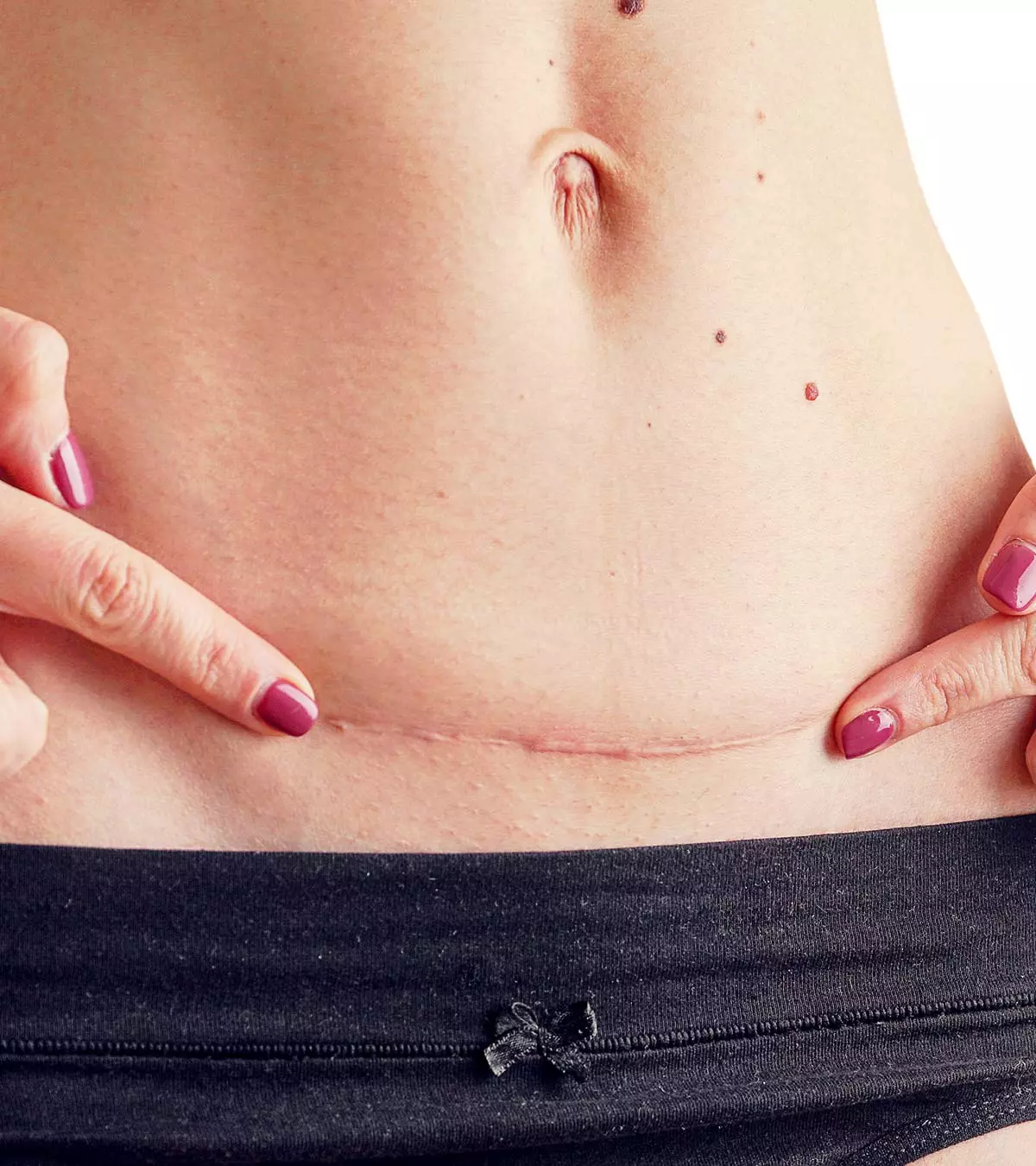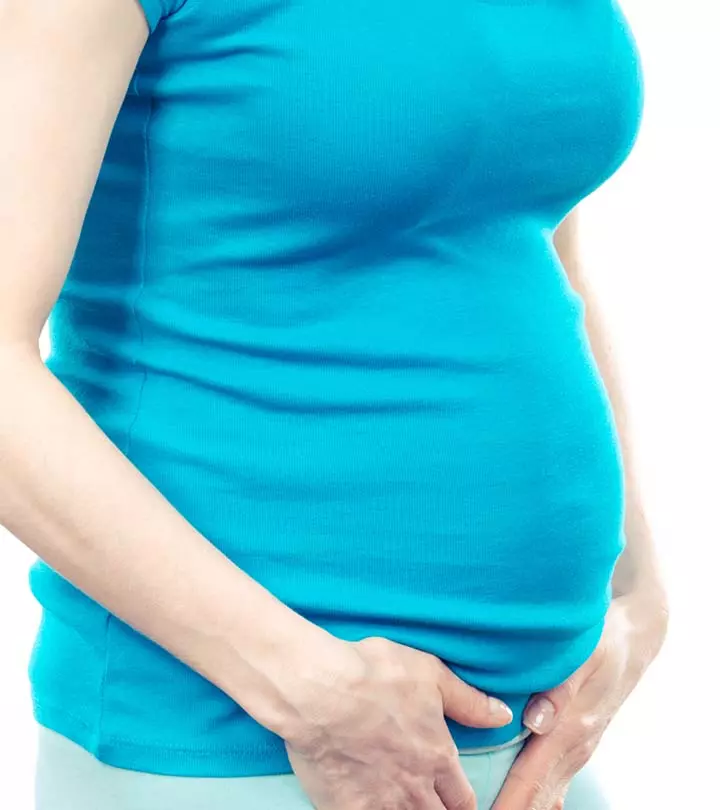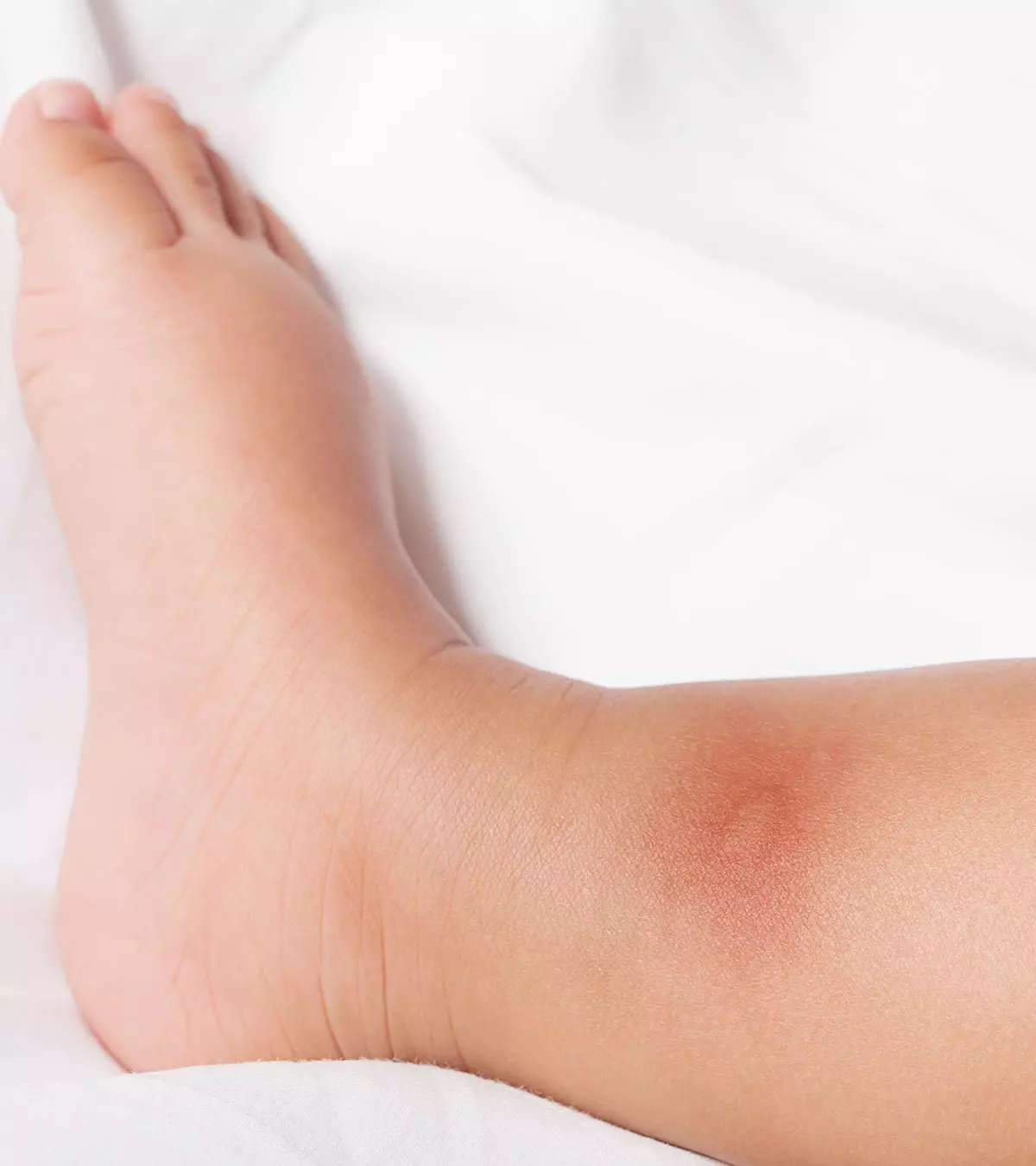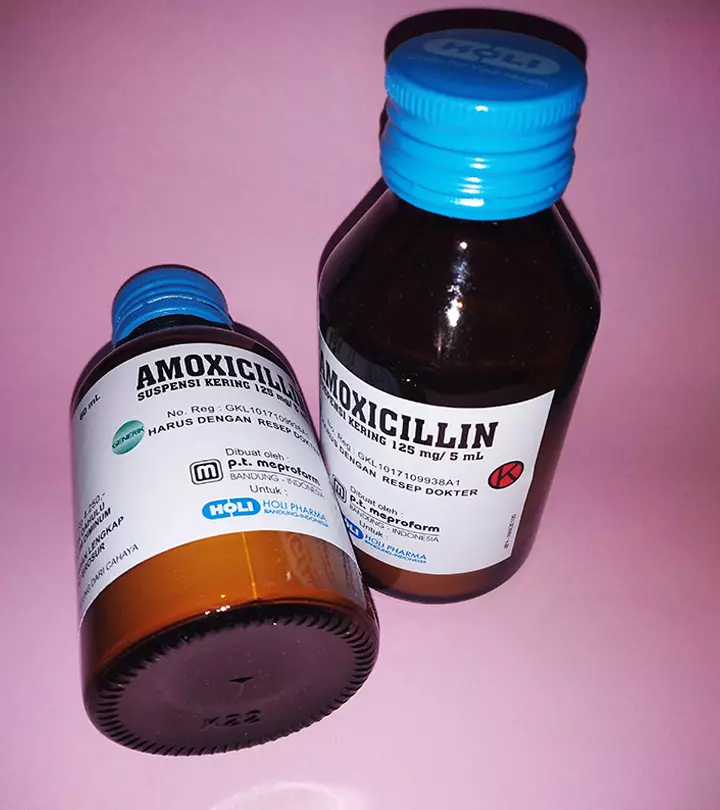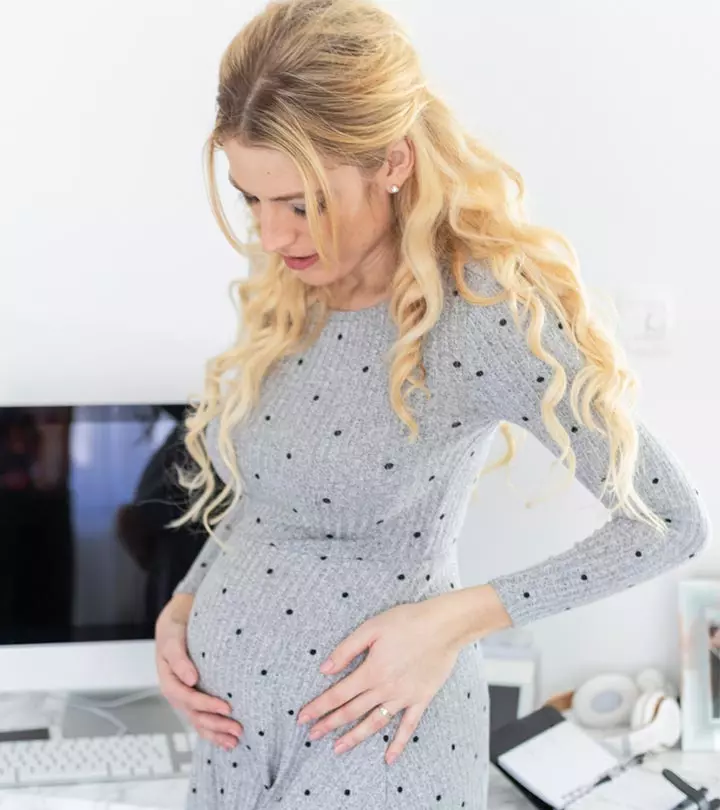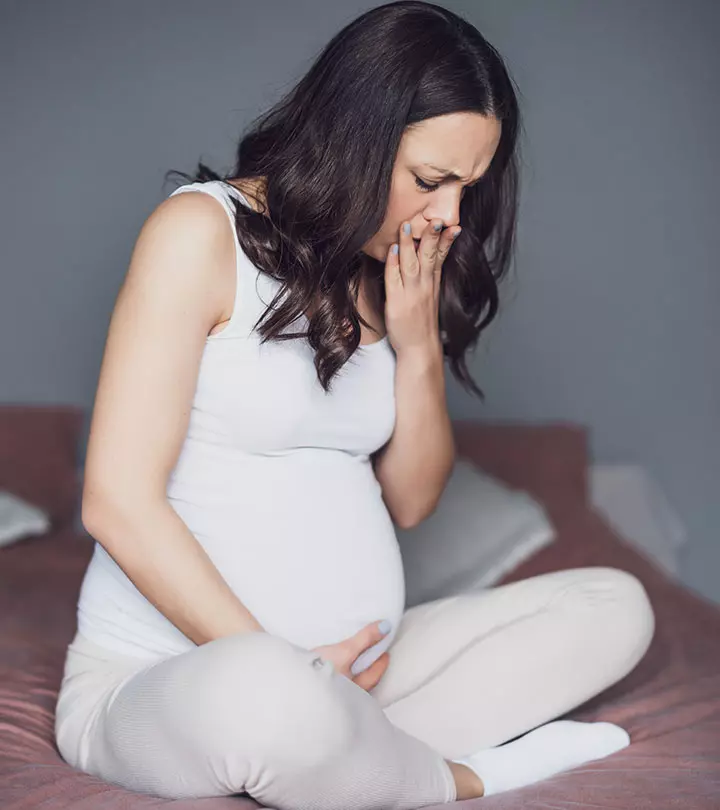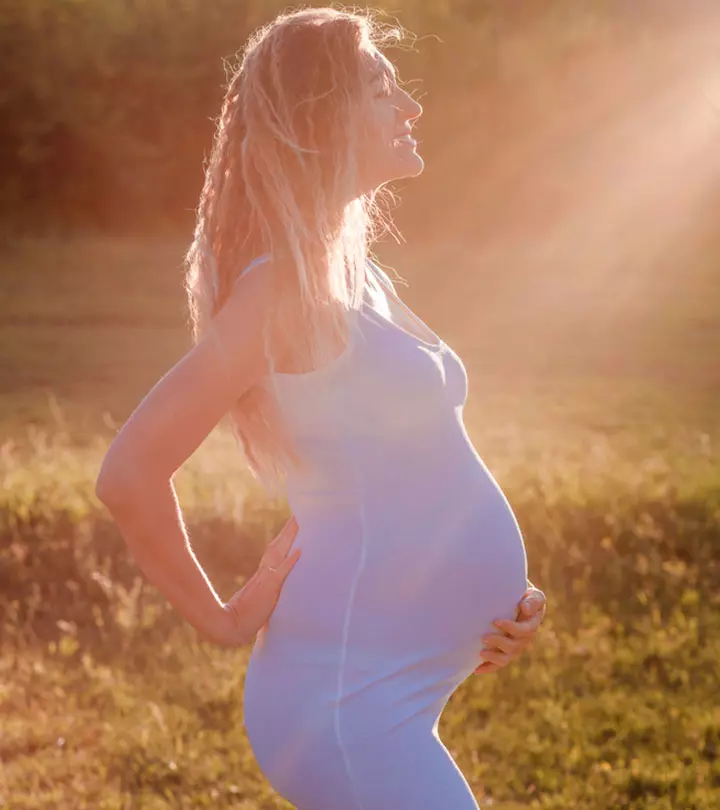
Image: Shutterstock
Vitamin D, also known as calciferol or the ‘sunshine vitamin,’ helps calcium absorption in the intestine and regulates calcium and phosphate levels in the body. Severe deficiency of vitamin D during pregnancy has been linked to poor bone health in babies. Besides, it may be responsible for certain pregnancy complications, such as preeclampsia. Most pregnant women can meet their daily vitamin D needs by consuming vitamin D-rich foods, sufficient exposure to sunlight, and taking prenatal vitamins. Yet, some women may develop vitamin D insufficiency or deficiency in some cases. Keep reading to learn more about the role of vitamin D in pregnancy and ways to improve its intake (1) (2).

Key Pointers
- Vitamin D requirement during pregnancy increases to support fetal bone and teeth development.
- The vitamin can be obtained from sun exposure or foods such as oily fish, red meat, egg yolk, and fortified milk and milk products.
- Pregnant women are at a higher risk of developing vitamin D insufficiency or deficiency.
- Taking supplements under medical supervision can help maintain optimum vitamin D levels.
Why Is Vitamin D Important During Pregnancy?
Vitamin D has two types – vitamin D2 (ergocalciferol) and vitamin D3 (cholecalciferol). While you can get vitamin D2 from edible mushrooms and supplements, vitamin D3 can be obtained from sun exposure, animal-origin foods, and supplements. However, both these vitamins need to convert into active vitamin D, which the body can utilize.
The biologically active metabolite of vitamin D, 1,25-dihydroxy vitamin D, helps in calcium absorption that supports bone mineralization and growth. During pregnancy, the levels of active vitamin D increase, particularly during the second and third trimesters, to support the fetus’ proper bone and muscle development. The increased calcium absorption from the gut and the fetus’ high calcium requirements are the main reasons for this increase. Thus, maintaining adequate vitamin D levels during pregnancy is essential.
Maternal vitamin D deficiency has been associated with skeletal homeostasisiBalance between the formation of bones and the continuous destruction (resorption) by osteoclasts disorders, congenital rickets, and an increased risk of fractures in the baby (2). Additionally, studies have reported links between low vitamin D levels and disorders such as metabolic syndrome, childhood allergy, asthma, and neurodevelopmental issues (3) (4) (5).
Furthermore, scientists theorize that active vitamin D also plays the role of an immune modulator that supports maternal tolerance to the foreign fetus since its DNA is half that of the mother’s. It is based on the finding that levels of the said metabolite increase earlier than the increase in requirement for the development of the fetal skeletal system (6).
Furthermore, anecdotal evidence highlights that consumption of vitamin D supplements may help reduce the risk of preterm birth. However, more research is needed to further ascertain this claim.
A Cochrane review further suggests that vitamin D supplements during pregnancy may reduce the risks of (4):
- Developing preeclampsiaiA condition characterized by high blood pressure and protein in urine and gestational diabetes
- Low-birthweight in babies
- Postpartum hemorrhageiA pregnancy complication characterized by heavy vaginal bleeding after childbirth

 Did you know?
Did you know?How Much Vitamin D Should You Take During Pregnancy?
According to the US National Institutes of Health (NIH), pregnant women require 15mcg or 600IU of vitamin D daily, while the World Health Organization (WHO) suggests a daily requirement of 5mcg or 200 IU(1)(8)
. However, the recommendations for taking supplements may vary depending on an expecting woman’s vitamin D levels, overall health, and risk of developing vitamin D deficiency.
The UK National Health Services (NHS) advises a daily vitamin D supplement of 10mcg (or 400 IU) during pregnancy, especially during the autumn and winter months (between September and March), as there is less sun exposure (9) (10). You may require 1000 to 2000 IU of vitamin D daily if a deficiency is detected (2). Consult your doctor to know the exact dose suitable for you, keeping your health and dietary practices in consideration.
 Expert says
Expert saysDo Prenatal Vitamins Have Enough Vitamin D?
Most prenatal vitamins contain 400IU of vitamin D, which may not be sufficient to fulfill your daily vitamin D requirement during pregnancy(2)
. Therefore, you need to consult your doctor and get vitamin D supplements prescribed accordingly. Additionally, take vitamin D supplements with food for better absorption.
What To Know About Vitamin D Deficiency During Pregnancy?

Large epidemiological studiesiStudies that deal with the prevalence of a health condition in different groups, its natural history, and causes have shown that many women, including pregnant women, have vitamin D deficiency. Vitamin D levels in neonates depend primarily on the mother’s vitamin D status; hence maternal vitamin D deficiency increases the baby’s risk of being deficient in the vitamin. The risk factors for vitamin D deficiency in pregnant women include (1) (2).
- Being vegetarian or vegan
- Limited sun exposure due to living in cold climates, residing in higher latitudes, or wearing sun and winter protective clothing
- Always wearing sunscreen on all exposed skin areas/surfaces
- Having a dark complexion (due to higher melanin content)
- Having a raised BMI as the requirements for vitamin D may be higher.
It is advised to consult your doctor if you feel you may require specific vitamin D supplementation.
Foods High In Vitamin D
The notable food sources of vitamin D to be included in the diet chart for pregnant women (1) (9):
- Oily fish such as herring, mackerel, salmon, and sardines
- Eggs, particularly egg yolks
- Red meat
- Mushrooms (sun exposure may elevate mushrooms’ vitamin D levels) (13)
- FortifiediWhen a vitamin or mineral is deliberately added to a food milk that includes dairy and plant-based milk such as soy milk and almond milk
- Fortified orange juice, cereals, and yogurt

Frequently Asked Questions
1. Can vitamin D cause birth defects?
There are no scientific reports of vitamin D causing congenital disabilities (16). However, according to WHO, Vitamin D toxicity may appear only at very high doses of 20000 IU per day and can lead to hypercalcemiaiA condition characterized by higher-than-normal calcium levels in the blood and hypercalciuriaiA condition characterized by higher-than-normal calcium levels in the urine (8).
2. When should I start taking vitamin D in pregnancy?
The levels of the biologically active metabolite of vitamin D start increasing from early pregnancy. However, fetal calcium demands increase during the second and third trimesters making vitamin D more important around this time (3) (6). Therefore, it is advisable to get your vitamin D status assessed by a doctor and take supplements based on your requirements.
3. Can I take folic acid and vitamin D together when pregnant?
Yes, you may take folic acid and vitamin D together during pregnancy. Both vitamins are essential to support fetal development and growth and healthy pregnancy progression. Thus, it is imperative to take prenatal vitamins under medical supervision for optimum maternal health (17).
Earlier, vitamin D during pregnancy was considered necessary for developing the fetal skeletal system. However, recent studies indicate that the vitamin has several metabolic, immunological, and neurodevelopmental functions. Besides, it may help pregnant women prevent adverse health issues, such as preeclampsia, gestational diabetes, and postpartum hemorrhage. Thus, maintaining optimum vitamin D levels is essential. To meet the increased needs, increasing the intake of vitamin D-rich foods may not be sufficient, and you may require supplements, especially if there is a preexisting deficiency (18) (19). A healthcare professional can prescribe you a standalone supplement in dosages appropriate to your requirements.
Infographic: How To Meet Your Vitamin D Needs During Pregnancy
Vitamin D needs during pregnancy increase. Besides supporting fetal bone development, optimum maternal vitamin D levels are essential to perform crucial metabolic and immunological functions. Thus, prompt identification and treatment of vitamin D insufficiency or deficiency are vital. The infographic below shares a few practical and effective ways would-be moms can maintain healthy vitamin D levels during pregnancy.
Some thing wrong with infographic shortcode. please verify shortcode syntaxIllustration: Vitamin D During Pregnancy: Importance Dosage And Foods

Image: Stable Diffusion/MomJunction Design Team
Discover how Vitamin D can help you and your child stay healthy. Join us to learn more about this subject.
References
- Vitamin D-Fact Sheet for Health Professionals.
https://ods.od.nih.gov/factsheets/VitaminD-HealthProfessional/ - Vitamin D: Screening and Supplementation During Pregnancy.
https://www.acog.org/clinical/clinical-guidance/committee-opinion/articles/2011/07/vitamin-d-screening-and-supplementation-during-pregnancy? - Ambrish Mithal and Sanjay Kalra; (2014); Vitamin D supplementation in pregnancy.
https://www.ncbi.nlm.nih.gov/pmc/articles/PMC4171878/ - Vitamin D supplements in pregnancy: what’s the latest evidence?
https://www.evidentlycochrane.net/vitamin-d-supplements-in-pregnancy-whats-the-latest-evidence/ - Carol L. Wagner and Bruce W. Hollis; (2018); The Implications of Vitamin D Status During Pregnancy on Mother and her Developing Child.
https://www.frontiersin.org/journals/endocrinology/articles/10.3389/fendo.2018.00500/full - Bruce W Hollis and Carol L Wagner; (2017); New insights into the vitamin D requirements during pregnancy.
https://idp.nature.com/authorize?response_type=cookie&client_id=grover&redirect_uri=https%3A%2F%2Fwww.nature.com%2Farticles%2Fboneres201730 - Natalie J Groves et al.; (2014); Vitamin D as a neurosteroid affecting the developing and adult brain.
https://pubmed.ncbi.nlm.nih.gov/25033060/ - Vitamin D supplementation in pregnant women.
https://iris.who.int/bitstream/handle/10665/85313/9789241504935_eng.pdf;jsessionid=09D6E2D8277C81E9051DD5F9982466BF?sequence=1 - Vitamins, supplements and nutrition in pregnancy
supplements and nutrition in pregnancy. - Vitamin D in pregnancy.
https://www.tommys.org/pregnancy-information/im-pregnant/nutrition-in-pregnancy/vitamin-d-pregnancy - Vitamin D stats and facts.
https://www.aad.org/media/stats-vitamin-d - Summer heat brings special health risks for pregnant women.
https://www.heart.org/en/news/2019/07/01/summer-heat-brings-special-health-risks-for-pregnant-women - How to get your vitamin D—with and without sun.
https://www.gundersenhealth.org/health-wellness/move/how-to-get-your-vitamin-d-with-and-without-sun - Omega-3 fats in pregnancy and breastfeeding.
https://www.seslhd.health.nsw.gov.au/sites/default/files/groups/Royal_Hospital_for_Women/Mothersafe/documents/omega3updateaug19.pdf - Vitamins
https://www.nhs.uk/pregnancy/keeping-well/vitamins-supplements-and-nutrition/ - Vitamin D.
https://www.medicinesinpregnancy.org/leaflets-a-z/vitamin-d/ - Do I need to take pregnancy multivitamins?
https://www.tommys.org/pregnancy-information/being-pregnant/nutrition-pregnancy/do-i-need-take-pregnancy-multivitamins - Getting Vitamin D during the dead of winter.
https://intermountainhealthcare.org/blogs/getting-vitamin-d-during-the-dead-of-winter - Vitamin D.
https://hsph.harvard.edu/department/nutrition/
Vitamin D in Pregnancy: Benefits, Sources & Dosage
Watch this video to learn why vitamin D is essential for pregnancy—supporting fetal bone growth, preventing complications, and how to meet your daily needs via sun, diet, and supplements.
Community Experiences
Join the conversation and become a part of our nurturing community! Share your stories, experiences, and insights to connect with fellow parents.
Read full bio of Hannah Whittaker
Read full bio of Dr. Joyani Das
Read full bio of Swati Patwal
Read full bio of Aneesha Amonz

 Point to consider
Point to consider Quick fact
Quick fact




